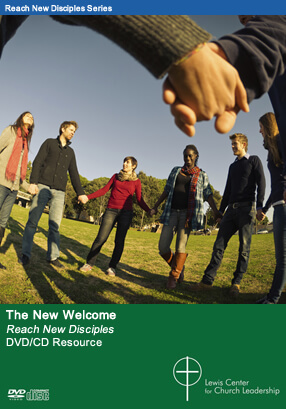Lewis Center Director F. Douglas Powe says it’s important not only to attract visitors, but to create a space where they will want to stay. Congregations wondering why their visitors don’t return need to honestly assess how they respond to visitors and what their church has to offer.
It is not unusual to hear a parishioner say, “We are a friendly church. Why don’t visitors come back?” Many congregations struggle to understand why they get visitors who seem to enjoy their visit and say they are returning soon, but never visit again. This can be extremely frustrating, especially for a congregation seeking to grow. The question is, “Why don’t they come back?”
Sometimes, when visiting a congregation, it feels like vultures are waiting to pounce as soon as you arrive. It’s as if a target appears on the visitor’s back.
1. Inwardly friendly
I have visited my share of congregations over the years and all of them claim to be the friendliest church. Yet, what I observe and what I am sure others experience is that people in these churches are friendly — but they are friendly to each other. Often, during the passing of the peace or congregational greeting time, parishioners greet one another warmly, but guests are left feeling like outsiders. It is not that people are not speaking to them, but that people are brushing past them quickly, so they can connect with those they know in the congregation. When this happens over and over again, it makes a visitor feel like an intruder and not a guest.
2. Uninspiring worship
If the point of contact for a visitor is worship, then nothing is worse than uninspiring worship. The sermon feels like it was a Sunday morning special. The music feels like the congregation has been singing the same hymns every Sunday for a year. In general, there is a sense that folk are there out of obligation and not because they expect to experience God’s transforming love and grace. Visitors are likely to sense quickly when things are done out of obligation rather than a true sense of investment. In a worship experience where it is obvious that even the regulars don’t really want to be present, guests certainly will not feel inspired.
3. Vulture syndrome
Sometimes, when visiting a congregation, it feels like vultures are waiting to pounce as soon as you arrive. You’ve barely made it through the door and someone is already signing you up to be the chair of the trustee committee. Obviously, this scenario is exaggerated, but there is still truth to it. When congregations are struggling to fill leadership positions and someone new walks through their doors, it’s as if a target appears on the visitor’s back. The visitor may well be open to serving in leadership, but the first visit isn’t the time for a visitor to hear about all the ways their gifts can be used.
4. No ministries
Even though a visitor isn’t likely to commit on Day One, the fact of the matter is many visitors are looking for ways to get involved. And this can be a challenge in many churches, especially smaller churches, where the only things going on are Sunday worship and one Sunday School class. A visitor interested in making a difference in the community or some other form of outreach, will quickly discover there is no outlet for their interest. This challenge is magnified when visiting families expect activities for the children. Even if they enjoy the worship experience or the Sunday School class they often do not return because nothing exists for their children.
Assess your strengths and weaknesses
The bottom line is that all congregations should honestly assess their strengths and weaknesses as they relate to visitors. One way of doing this is to ask someone who is unfamiliar to the congregation to visit and then report back on their experience. This can open the eyes of the congregation to areas that may need to be addressed. It may not be possible to resolve every issue, but tackling one or two is important — for example, making sure parishioners do not simply brush past visitors to get to friends and making changes to the worship experience that will inspire others to experience God’s love and grace. It is important not only to bring in people, but to create a space where they will want to stay.
 Related Resources
Related Resources
- The New Welcome, a Lewis Center video tool kit resource
- Pet Peeves of a Church Visitor by Greg Atkinson
- 50 Ways to Welcome New People, a free Lewis Center resource






